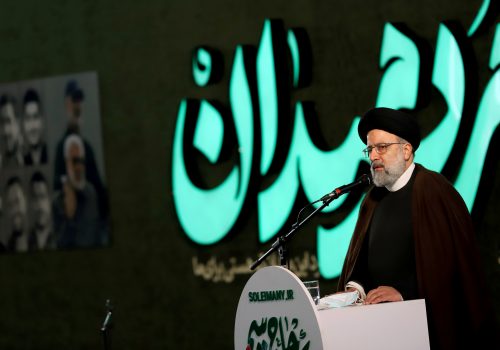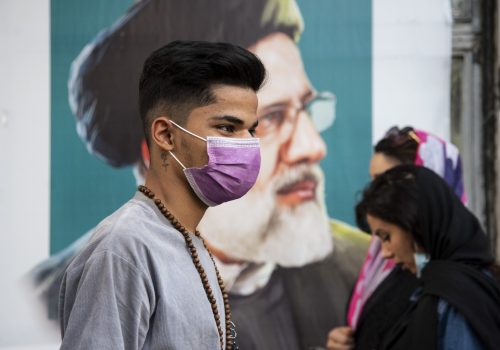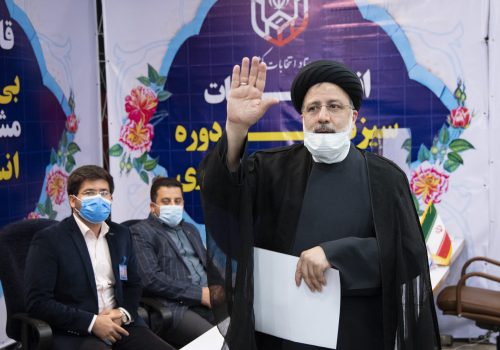Saeed Jalili: The former nuclear negotiator that rubs diplomats the wrong way
“[Nuclear negotiator Saeed] Jalili then embarked on nearly forty minutes of meandering philosophizing about Iran’s culture and history, and the constructive role it could play in the region. He could be stupefyingly opaque when he wanted to avoid straight answers, and this was certainly one of those occasions. He mentioned at one point that he still lectured part-time at Tehran University. I did not envy his students.”
This is how current Central Intelligence Agency Director William Burns—at the time Under Secretary of State for Political Affairs—described the then top nuclear negotiator for the Mahmoud Ahmadinejad presidency in his 2019 memoir, The Back Channel: A Memoir of American Diplomacy and the Case for Its Renewal. The two had met for the first time in the summer of 2008 as part of the P5+1—five world powers plus Germany—talks over Iran’s controversialnuclear program.
Jalili, fifty-five, is an ultra-hardline politician running again in the Iranian presidential election on June 18. Nicknamed the “living martyr” after losing his right leg fighting in the 1980s Iran-Iraq War, it is believed that the eight-year war shaped his world view. One Tehran University professor explained: “He sees the US and Europe as guilty for supporting Iraq against Iran. When he’s sitting down with them, I’m sure his experiences are somewhere in the back of his mind.”
A look into his background gives a better sense of his political views. Jalili, who, like presidential candidate and current Judiciary Chief Ebrahim Raisi, was born in the holy city of Mashhad, also has close ties to Ayatollah Ahmad Alam al-Huda, the city’s hardline Friday prayers Imam. Al-Huda, whose son-in-law is Raisi and whose radical remarks have always sparked controversy in Iran—especially about Iranian women—supervised Jalili’s PhD. The former nuclear negotiator has a PhD in political science from Imam Sadegh University in Tehran. His 2002 PhD dissertation, “The Foundation of Islamic Political Thought in the Quran,” highlights his pious and ideological nature, as does a book he wrote roughly three decades ago, The Foreign Policy of the Islam Prophet.
The hardline candidate also has a record of working in the office of Supreme Leader Ayatollah Ali Khamenei. From 2000 to 2005, he was the Director of Contemporary Studies in the office of the Supreme Leader. In addition, the hardline politician had previously served in the Foreign Ministry for eighteen years. He first served in the Foreign Ministry’s Inspection Office and then was the head of the Foreign Ministry’s office for US Affairs during President Mohammad Khatami’s first term.
After Ahmadinejad became president in 2005, Jalili left the Supreme Leader’s office and returned to the Foreign Ministry. This time, he was appointed as the head of the Foreign Ministry’s US-Europe Affairs Office.
Luck was also on Jalili’s side once Ahmadinejad took office. Soon after, Ali Larijani was removed from the post of Supreme National Security Council secretary and Jalili took his place, even though his futile attempts at the negotiations table with Europeans yielded no results. Not only were punitive, multilateral sanctions imposed on Iran at the United Nations Security Council under his tenure, but talks with world powers continued without success from 2007 to 2013. Many Iranians see him as an unskilled negotiator for that reason.
Perhaps, Burns was right to say in his memoirs about his first meeting with Jalili: “The same evening, I wrote in a short note to [the then Secretary of State] Condoleezza Rice that today’s five-and-a-half-hour conversation with the Iranians clearly reminded me that we had probably not lost anything over the past few years.” Similar comments from European and American officials were echoed in cables published by Wikileaks.
Jalili decided to run in the 2013 presidential election, although he was not listed among the three main candidates in the Principalist camp. At the end of the 2013 election, he came third with about 4.2 million votes, behind current President Hassan Rouhani with nearly nineteen million votes, and former Tehran Mayor Mohammad Baqer Qalibaf with four million votes. Just months after the election, in October 2013, al-Huda quoted the Supreme Leader as saying that Jalili’s “four million votes show there is a base in this society.”
After Jalili’s defeat in the 2013 elections, many hardliners expected him to run again in the 2017 elections. But, following another hardline hopeful Raisi entered the race, Jalili announced that he would support the hardliner cleric and would not run in the elections.
Jalili, who did not run in the previous 2017 elections in favor of Raisi, has rejoined this year’s race despite the judiciary chief’s second run. Iranian critics of the hardliners accuse all Principalist candidates of running only to back Raisi in the debates, who is expected to be the winner of the June 18 vote after the disqualification of rival candidates like Larijani. There is a commonly shared belief that they will quit the race right before the election in favor of the hardline cleric, though the candidates themselves deny this.
On June 5, at the end of the first round of presidential debates, Jalili surpassed expectations and came out much more successful than Raisi, as he launched an onslaught on his main reformist rival the former Central Bank Chief Abdolnasser Hemmati and was able to elaborate on his future plans for governing the country. Contrary to expectations, the poll results carried out on social media suggest that Jalili is gaining more support. This is while he was thought to have entered the race to support Raisi’s candidacy.
The second debate on June 8 was uneventful, though the likelihood of intra-group rivalry between hardliners increased. As a result, Jalili can be seen as a back-up candidate, who is gradually depicting himself to be a serious challenge. This is especially the case if hardliners sense that Jalili is better suited for the presidency than Raisi, since the latter appeared weak in the past two debates.
However, this may not happen given that this election has been seemingly planned in favor of Raisi with rival candidates disqualified. It is possible that if elected, Raisi may name Jalili as foreign minister, return him to his role as top nuclear negotiator again, and/or appoint him as secretary of the Supreme National Security Council. It’s worth noting that Jalili has been a staunch critic of the signing of the 2015 nuclear deal from day one. In this vein, he has always sharply criticized President Hasan Rouhani’s foreign policy.
Jalili has also strongly opposed the current ongoing Vienna talks, where Tehran and Washington are involved in indirect negotiations to revive the Joint Comprehensive Plan of Action (JCPOA), which the Donald Trump administration withdrew from in 2018. “Is the solution to the country’s problems during the last one hundred days of the government to go to Vienna to see how many sanctions are lifted and they give a list [of the sanctions] and classify them?” he said in apparent reference to the US attempt to divide sanctions into JCPOA-related and non-JCPOA sanctions at the talks.
Jalili added, “The Rouhani government must not keep the country waiting for the result of negotiations and the will of some world powers. The country’s economy cannot be governed this way.”
Jalili’s success will undoubtably cause concern among those who welcome détente between Iran and the West. On the other hand, it can also be good news for those who seek to increase Iran’s tensions with the West, particularly with the United States.
Saeid Jafari is a Middle East analyst based in Europe.He has written for various outlets including Foreign Policy, Al-Monitor, Middle East Eye. Follow him on Twitter: @jafariysaeid.
Image: A supporter of Iranian presidential candidate Saeed Jalili holds his picture during a rally in Tehran June 12, 2013. Picture taken June 12, 2013. REUTERS/Yalda Moayeri


